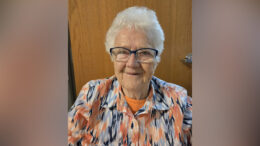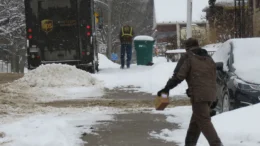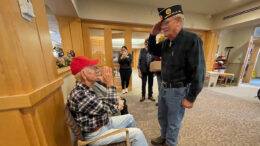ALTOONA (AP) – Juniata College has taken ownership of more than 300 acres in Bedford County after a farm was donated by Altoona couple Jack L. and Carolyn A. Sparks.
“We could have sold it many times, but we wanted to have it remain undeveloped,” Carolyn said, revealing that Huntingdon’s Juniata College offered that promise.
Jack said the farm, which sits about 5 miles outside of Everett, has been connected with his family since 1794, and in 1970 he and his wife purchased the property from relatives, using it for many different purposes during their decades of ownership.
The Sparks, both in their 80s, were educators in Bedford and Blair counties before retiring.
Still, in tandem with their education careers, they found time to raise livestock on the farm.
“We raised beef cattle for some time,” Jack said, noting they would raise up to 130 heads of cattle, as well as smaller animals like chickens, at one time. “It was a lot of extra work.”
In their Altoona home last week, the Sparks displayed a photo album, which contained many images from decades past, showing both the family and their cattle operation.
Carolyn, who grew up in a more urban setting, said tending to the cattle was sometimes a learning experience. However, she said her happiest memories of the farm were of its vast landscape, which is surrounded by mountains, as well as the Raystown Branch of the Juniata River.
“That’s the beauty of the property,” she said. “It sits on a peninsula, and all the acreage is surrounded by water.”
Memories of hunting and fishing on the property, which houses several buildings, including a home, were among some of the highlights listed by Jack.
And the Sparks said they liked to share their land. Jack said he used to take students from his advanced-placement biology classes to the farm, and the couple said they hosted a summer camp for about 15 years.
More than 300 children from ages 6 to about 14 or 15 spent their summers at the camp called No-dse-wa-ope – a name Carolyn said she chose to honor a territory along the Raystown Branch once occupied by the Susquehannock. Translated, No-dse-wa-ope means quiet heart, she said.
“It just seemed like an appropriate name,” Carolyn said.
In fact, Jack said he has some Native American heritage, and he and his father found many Native American artifacts, such as arrowheads, on the farm.
Even with the large number of people visiting and using the farm’s grounds, Carolyn said the time she spent with her late sons, Scott D. Sparks and Todd G. Sparks, were most special to her.
“They spent many summers and weekends at the farm helping with farm duties, enjoying and appreciating nature. … It’s our hope that others will learn to appreciate and understand how we depend on each other and the natural surroundings of our earth and universe to survive,” she said in a statement.
Carolyn shared one memory of her sons running to different points of the property to watch the rising moon.
“We could watch the moon rise three or four times,” she said, explaining they were able to watch the event from multiple vantage points. “We’ll always keep the farm in our hearts.”
In recent times, the couple has been unable to use the land as readily as before, and, in some cases, it has been rented to local farmers for different uses, they said.
However, the Sparks said they thought about the property’s future, and, with no one to pass it on to, they looked toward gifting it to an educational institution.
“It’s bittersweet,” Jack said of the decision.
Originally, the Sparks were in negotiations with another area university, but a deal could not be reached, they said.
It was at a holiday get-together that Jack Makdad, a longtime friend to the Sparks and 1985 Juniata graduate, seeded the deal with the college.
“I knew they were looking to do something with their farm. … They didn’t want it developed, and they wanted to do something educational if they could. I felt like Juniata would be a perfect fit for them,” he said.
About a month after the first conversation, the Sparks began to show an interest, Makdad said, adding that they were able to visit the college’s Raystown Field Station, a 365-acre reserve on Raystown Lake used for environmental research and education.
“It was what the Sparks envisioned,” Makdad said.
Jack Sparks said he was impressed with what Juniata had to offer.
“It was an easy conversation with Juniata,” he said. “They were all very cooperative and very interested.”
Carolyn said she also felt the college was a good fit for the farm.
“It has been an honor for us to work with a college that has the same interest as us,” she said.
The deal with the college was finalized at the end of December, said Rob Yelnosky, Juniata’s finance and operations vice president.
A press release from the college listed the property’s value at $1.2 million.
“They could have sold this property for a hefty price,” Makdad said. “They are just great people, and what an unselfish thing for them to do.”
The plan is to create an environmental center where people will have an opportunity to experience the outdoors and use the land as a living laboratory, Yelnosky said.
The Sparks will continue to be involved, as Jack Sparks said he and Carolyn will sit on an advisory board for the property.
“And I still have access to it; that access is still there,” he said. “The name will stay with it; the history will stay with it.”
In a statement, Juniata President James A. Troha expressed his gratitude for and excitement about the land donation.
“As longtime educators, Jack and Carolyn recognize the advantages of experiential education, and their ancestral farm offers an almost perfect field experience for a wide variety of disciplines … and its potential clearly resonates with one of Juniata’s great strengths: providing students different avenues to learn through direct and varied experience,” he said.
Last week, Carolyn listed archeology, astronomy, biology, environmental science and history among some of the fields of study that will benefit from the land.
Yelnosky commented on the many uses, as well.
“The opportunities are limitless,” Yelnosky said. “(Faculty members) were immediately coming up with things we could do to provide students great experiential learning.”
Yelnosky said some work has already been done at the farm. Biology students took samples from nearby water sources, and archeology students will soon start looking at the Sparks’ Native American artifacts, with a possibility of digging for more.
“There’s a good chance we will be able to find evidence of Native Americans living there for the past 8,000 years,” anthropology lecturer Jonathan Burns said in a statement issued by the college.
At least one other faculty member also spoke about the academic benefits of the property, especially the ecosystem that differs from the area near the college’s Raystown Field Station.
“This creates a kind of ecological corridor connecting Raystown Lake to a truly riverine headwaters system,” said Dennis Johnson, an environmental science professor.
In addition to becoming an asset for the college’s students, Yelnosky said the farm likely will be used by the community at large.
He said officials have talked about outreach programs for younger students – those in middle and high schools. Also, the farm’s rivers and trails lend themselves to recreation possibilities, such as biking and kayaking, Yelnosky said, adding officials will begin work as soon as weather permits.
Makdad, who’s visited the farm since he was young, said it’s exciting to know that people will be using the land again.
“The property used to be alive and vibrant, but it has slowed down,” he said. “I think this is great for the property.”




































